#but because they are two different social classes at an institutional level
Text
i honestly feel like the cis vs. trans debate depends on how we’re defining the terms. “trans” as in “no association with your agab whatsoever”? probably excludes a good sum of trans people. “cis” as in “only expresses their gender through stereotypical presentation and/or never experiments with the concept of gender”? probably excludes a good chunk of cis people. but this doesn’t necessarily conflict with or negate the cultural significance of being cisgender or transgender and labeling those experiences as such. cis and trans people obviously receive very different treatments and privileges, so it’s less about strictly defining what it means to be cis or trans and more about how these terms (as broad groupings) help us understand and identify where we stand. they’re communication devices first and foremost, not diagnoses. i hope that makes sense
#which is why i bagged on that post. the point of cis/trans/gay/straight/allo/ace is that they’re labels created to express a part of us and#describe experiences that impact our social power and how we are treated#straight and gay are incompatible as tangent labels not because they’re like polar opposites or because they’re different species or smthn#but because they are two different social classes at an institutional level#and because the words were created to identify this inequality. ‘straight’ literally means ‘exclusive opposite gender attraction’ which obvs#conflicts with the definition of gay. like to say you can be both is to say that these words are essentially meaningless and were invented#as borders that don’t actually exist. and there’s a sliver of a chance that in a different world this could be true#but right now in this political climate the distinction matters. abolishing and disregarding the meaning of these words literally helps#no one#having words and labels and language to express ourselves is very crucial so i’m really not interested in arguments that are essentially#‘i use words regardless of what they mean or the weight they carry because it doesn’t matter to me’’#besides if you told a gay person irl that they could be straight also or that there’s no difference between them and their oppressor they’d#fucking punch you lol#neon talks
27 notes
·
View notes
Text
11 year old Gerry Kaey - a psychological analysis

[ID: screenshot from a spreadsheet of two columns and two rows. The first column is labeled “First Name,” with “Gerard” listed below it. The second column is labeled “Last Name,” with “Kaey” listed below it. End ID]
Like everyone else, I was of course delighted by the presence of our beloved arsonist on our list of child test-subjects at the World Line 2 Magnus Institute (not delighted that he was having unethical psychology experiments performed on him, delighted by his presence. though it’s possible that this was actually a better childhood than he had with Mary. but I digress.)
(Data set can be found here, if anyone else wants to make a copy and play with it, and this post has my fave analysis of the sheet itself)
The data for Gerard Kaey was absolutely delightful, and it indicated more than almost anything else that some people were in fact the same (or very similar) across world lines. I was going to post about it and then I remembered that not everyone was forced to take a slightly outdated Educational Psychology class recently, and thus the random names at the top would not be indicators of fuckin anything without extensive Googling.
I figured trolling the internet for details on outdated developmental psychology theories and unethical sociology experiments is not most people’s idea of a fun afternoon (tho in the magnus fandom you never know); either way I figured I’d pull out the fun and interesting data on this goth child and translate it into human terms for us all to enjoy.
(QUICK NOTE: Pretty much all of these theories are outdated on account of being No Good and quite reductive and many of the experiments are EXTREMELY fucked up (all of which makes sense, given where these fictional data came from). If you’re curious about any of the actual psychological theories and criticisms, here’s a relatively jargon free summary, with further reading at the bottom. I’m gonna follow the time-honored tradition of psychology professors and say “well it sucks and was bad that this happened BUT it did happen and we might as well use the data to come to some general conclusions and/or ask better questions, especially about the people performing those tests in the first place.” anyway ty for coming to my TED talk ONTO THE GERRY DATA)

[ID: screenshot from a spreadsheet of three columns and two rows. The first column is labeled “Kholberg,” with “Level 3” listed below it. The second column is labeled “Prosocial,” with “High” listed below it. The third column is labeled “Empathy Index,” with “95%” listed below it. End ID]
Let’s start here.
Kholberg’s Theory of Moral Development is a metric for measuring the moral development in children. It has three stages. A child who has reached the “third stage” demonstrates a consideration of the needs and feelings of others when making morality-based decisions and judgements, even above the norms and expectations of society.
Prosocial behavior is behavior that can be characterized as having no direct benefit to the person performing an action; something done entirely for the good of others.
Empathy Index is pretty self-explanatory (as far as I can tell, it’s not actually based on anything and is something the researchers created just for this experiment).
So far, we’ve got a rough picture of Gerry as a kid who has a strong moral compass, who is quick to help, even when there’s no benefit for himself. Who considers what the people around him might want or need. Who is able to throw social expectation out the window when someone else is in need.
Reminds me of that older, slightly different version of himself, sitting alone at a table in Venice, wearing a Hawaiian shirt because he’s “on vacation,” sighing in exasperation at the interruption and telling a stranger to think of her mother.

[ID: screenshot from a spreadsheet of two columns and two rows. The first column is labeled “Milgram,” with “Low” listed below it. The second column is labeled “Asch,” with “Low” listed below it. End ID]
These are my favorite rows. They’re all the way at the end of the spreadsheet, which kind of makes me imagine that the testers had this image of a highly developed child, a kid who seemed perfect for whatever they had planned. And then…
Milgram was the motherfucker who ran the experiment where people were told to press a button, and when they did, another participant was delivered an electric shock. (there wasn’t actually a shock in Milgram’s experiment, just an actor pretending to be shocked. The socks were fake, but the psychological damage was real!) The test was designed to measure how long people would continue to do what they were told by the “scientist” running the test, even as the electric shock appeared to grow stronger. A “low” score is indicative of someone who bailed out ASAP, no matter what the test-runner said.
The Asch Conformity Experiment put a large number of people in the room (most of whom were actors) and showed them a series of images of lines with different lengths, and they had to identify which was longest. The actors all gave the correct answer for the first few, and then all of them started to give the exact same wrong answer (i.e. all of them would say B, even if Line A was clearly longest). The test measured how likely a subject was to conform to the group opinion, even when they knew the people around them were objectively wrong, if they were the only one offering a different (but correct) answer over the course of several rounds of images.
I have this super clear image of little Gerry in a ratty pair of jeans and a band t-shirt, long hair absolutely unbrushed, walking into a room with a dude in a lab coat and someone else strapped to a chair and IMMEDIATELY getting suspicious, and just refusing to press the button again once he realized what it did, leaving the actors just… lost as to how to proceed. And then with the Asch test, he’s just sitting there with a look of incredulity on his face looking at the people around him and saying “do you people need fucking glasses all of a sudden? it’s not fucking B.” and just ignoring them for the rest of the test.
and all of the Magnus people who had been VERY excited about this promising young person all of a sudden realizing that they have accidentally recruited a VERY intelligent juvenile delinquent.
so there you have it! World Line 2 Gerry Kaey was kind when he didn’t have to be, he didn’t give a shit how other people felt about him, he cared deeply for other people, UNLESS of course they were people in authority, in which case he told them to go fuck themselves.
*dreamy sigh* that’ll be our Gerard
final fun notes:
Gerry has the second highest number on the Empathy Index at 95%
The only kid who beat him, with a score of 98%, was 9 year old “Samara Khalid”
10 year old “Conner Dyer” scored “Low” on the Milgram and Asch tests JUST like Gerry. I wonder if they were friends.
Other than that, Dyer is almost exactly average among the rest of the data
Khalid scored “High” on both Milgram and Asch
Wonder how that’s gonna affect things 👀👀👀 high empathy, high value on what other people think
Sam thats so autistic of you I love u
Khalid was also on “Level 3” of Kholberg and had “High” levels of Prosocial behavior, despite being only 9 (super young to have the abstract thinking necessary for that)
#long post#tmagp#the magnus protocol#gerard kaey#the magnus institute#tmagp meta#gerry kaey#tmagp spoilers#tmagp arg#I have so many wikipedia pages about psychology open on my bowser#anyway I hope you ENJOY#I was gonna just make a post with the screenshots and the ‘that’ll be our gerard’ but then I realized that would be fucking inscrutable#so now we have this#yw#(???)
51 notes
·
View notes
Note
Shouji's logic and reasoning, and by extension the hero's, kind of sucks honestly, if this was all that this plot line was building up towards.
'The next generation will do/be better', really?
I mean, it's not as bad as 'you hurt people so your argument is invalid' but it's still not great.
It's kind of a circular logic that turns baby steps into milestones, that then keeps feeding into itself over and over. The people who are truly against the changes that the mutants (minority) need are just going to ensure their children feel the same way as they do, some may break away but we've seen (even in bnha's story) how powerful a narrative taught since childhood can be. And even when there is real improvement (like written laws), all it would take to undue such slow and peaceful change at a societal level is one too many (or too powerful) A-holes coming into prominence in government to undue it.
Do you feel the same or differently ? And what do you think about it either way?
I am kinda of feeling put off by Spinner and Shoji's treatment these last chapters. it feels weird, like Spinner is being silenced by the narrative when put against Shoji.
Two different asks, but I'm answering them together.
So, my thoughts on this are the same as my thoughts on the Shouto vs Dabi fight. None of this was news (with the sole exception of the added quirk racism angle).
The tl;dr version is that the heroes are responding the way they always respond to any criticism aimed at the system: they're shutting down the argument instead of addressing any of the points that were raised.
Shouji is not an exception. Shouto, Ochako, Deku and Mirio have done it as well. It's a pattern, and the fact that their knee-jerk reaction is always to defend the system without blinking twice is meant to be part of the problem. I'm not stating any of what follows to judge them, or to expect the impossible from them. But the kids are parroting the kind of narrative their society is based on, because they grew up as part of said narrative, and can't see past it.
Shouji roots his argument on the idea that Spinner (and his followers) are not channeling their anger "the right way." Because they've elected to use violence, they've automatically "lost" the debate, because violence is always bad and unjustified.

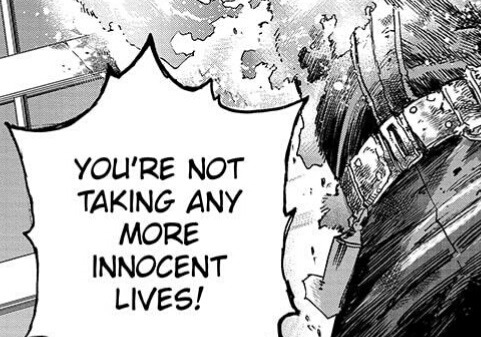
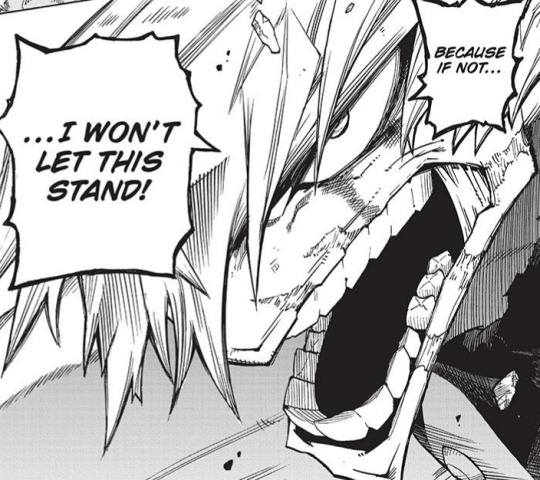
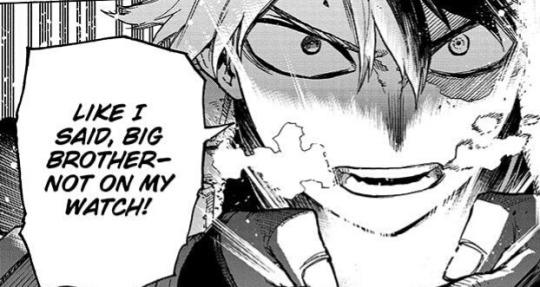
This idea echoes Shouto's words to Touya. Every time a villain who fell through the cracks attempts to have a dialogue with heroes, the response they receive is the same: your reasons are good, but you dragged innocents into your path, so I won't even pretend to listen to your demand for social justice.
The problem with this reasoning is that heroes routinely use excessive violence, too, and just as routinely get away with it. Even foregoing how the number one and two were exposed as a violent abuser and a murderer respectively, and got no consequences because they're hereoes... There's also the fact that the institution behind heroism has been killing people with opposing political views for decades, and keeps doing so even now. The whole first war arc was set in motion by Twice's extrajudicial murder, and several attempts were made to extend the same treatment to Shigaraki as well.
So. "Violence bad" is a losing argument when both sides have bloodstained hands. Both sides have shown a lack of remorse for the methods they used when they were fighting for a cause they deemed worthy. In the heroes' case, it was "the greater good." In the villain's, some sort of social retribution for their suffering.
But let's take it one step further. In the specific context of mutant discrimination, Shouji's words ran particularly empty imho.
The kid claims that this ambush "sets back their cause 30 years." I find this a malicious scapegoating. Why?
The mutants are *not* responsible for their own oppression. Similarly, they're also *not* responsible for the punishment they receive when the privileged class in change decides they were existing a little too loudly for their liking.
If I'm honest, I found this rhetoric abhorrent when I first read the leaks. I'm still holding out hope that it was a mistraslation because the phrasing was... Pretty bad. Like, echoing real world bigotry bad. But this hope seems pretty thin, considering how Shouji also submits that the solution to that discrimination is to just... Lay down and take it until things get better.
Now, here's where I'm conflicted because Shouji was also a victim of that quirk racism. He was covered in bandages, and now has scars to match. He was called slurs, singled out as carrier of "tainted blood", made to feel like he was lesser, monstrous, and like he had to mask up for other people's comfort as well as for protection from further harm. It's not even fatfetched for him to normalize the bigotry he suffered and shrug it off as something he's just "used to." But I think the mistake he makes is demanding that all victims of anti-mutant discrimination should feel the way he does, and adapt the way he did. But I think it's also important to note his bias here.
[Edit: I'm switching the angle of my analysis a bit here because I realized the flaw in my reasoning. Please share this version of this post instead of the one where I fell for the trap of "who is the more oppressed" mentality that... Leads nowhere because it's not a competition]
Shouji seems to think that since change won't happen during their lifetimes, mutants should all work with their current circumstances instead of working to dismantle them. He wants to affect change from within the system because he believes this to be a better alternative than seeking, and I quote, "retribution."
Basically, like all of class A, Shouji is an idealist. Even if he doesn't have all the answers yet, he believes that individual battles can one day turn the tide for the cause.
He's obviously motivated by a wish to move past senseless violence and bloodshed, and his ideals are not wrong in theory. However, the irony here is that by shutting down fellow heteromorphs and siding with the system over the voices of his people, he's unconsciously promoting in-fighting.
As I've stated elsewhere, he's not offering them a dialogue, but just serving the interests of the oppressors by creating differences between himself and the villains. Instead of acknowledging their common ground, he says "I was persecuted too, BUT." The but is the problem. He's seeing a fundamental difference between them, and blaming fellow victims for the "set backs" of the cause, instead of addressing why would non-heteromorphs want mutants to stay quiet about their oppression in the first place.
For so many people, that prejudice and discrimination is still their daily reality. The threat on their lives doesn't go away simply because some kids in a hero school are determined to make the distant future a better place. It's all nice and well that Shouji aims to be the kind of hero who can affect change for heteromorphs from inside the heart of hero society, but it doesn't stop nazi-coded cults like the CRC from harming people in the present.
When you see how bad things are outside the city, Shouji's words of reassurance about the next generation are just an empty platitude. They might come from the heart, but they don't mean anything to those who need the heroes' help right now. Those people need shelter and security. And the point is, they're not currently getting it.

Chapter 370 shows the crowd parading around CRC masks on pikes. So long as people are granted the freedom to reunite and discriminate against heteromorphs, there's no such thing as advocating for non-violence. It's people like the CRC that threw the first (non-metaphorical) rock. It's not the same thing and it cannot be the same thing when people fight back for their right to live. Protesting, fighting back, even when the circumstances dictate the use of violence for self-preservation, does not have the same magnitude as the violence perpetrated by the oppressors who literally want to wipe you out.
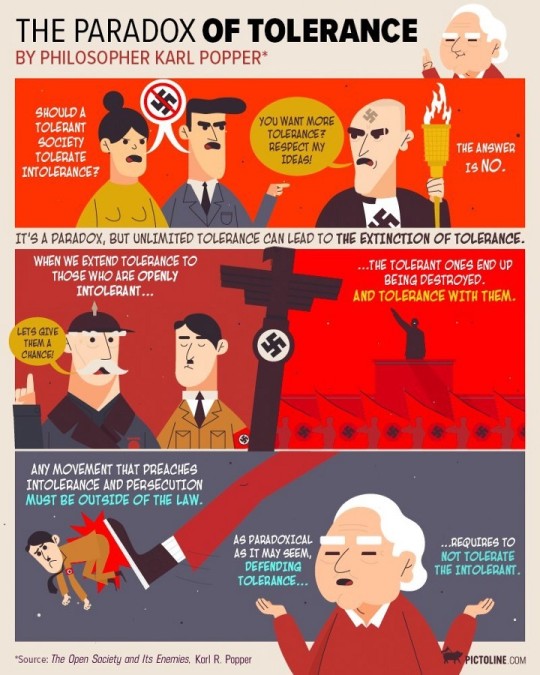
In other words, we're facing what's known as the paradox of tolerance. To truly have a tolerant society, you can't tolerate hate crime.
Incident 6/6 was a massacre against "innocents", too. Heroes don't get to use that word as moral ammo only when it supports their narrative, and elect to ignore it when it doesn't. If violence against defenseless people is always bad on principle, how come the only time they decide to enforce it is when it makes them put villains behind bars?
152 notes
·
View notes
Text

Bridgewater fanart! (Who is surprised? /lh /j)
This fanart has been inspired by Lauren Shippen herself, from the # she put on the reblog she did of my Jeremy Bradshaw sleeping fanart “also: new headcanon I now have vipin started TAing for Jeremy when he was still in undergrad soJeremy also has one photo of the two of them at Vipin's graduation in his office”. So I had to draw it of course, I’m so thankful for Lauren’s support, feeling truly so honoured so this is the least I can do 🤧
This is to me, what Vipin asked to do to Jeremy, and so he did because he has always appreciated Vipin (a beginning of friendship there?? They both cherish that pic for sure and yes I plan on drawing Jeremy’s office, and yeah I only drew this to put it in a small frame in Jeremy’s office, that’s my dedication 😭🤌 I’m putting a read more for a further explanation of my headcanon and also the outfit (regalia, cords, medallions wise) because yeah there is a whole day of research behind this and also finger cramps because my Apple Pencil decided to slowly d word on me as I was trying to finish this fanart so I used my fingers jejdjd)
So: please know that I’m French, so it was very hard to find information about graduation ceremonies: we do not have that in France, so I’m sorry if something is off!
First of all, professors and whole faculty members must wear their regalia at graduation ceremonies hence Jeremy having his academic regalia. And it made me learn that the velvet colour on some parts of it + the hood colour differ depending on the field they had their phd in, Jeremy’s is white because to me he has his phd in history (at least from what I understood, as even in S1 EP01 he talks in his lecture room about getting credits in history) which counts in the “art, social and humanities” section because history counts as humanities which is white. (Which also explains why Vipin’s tassel on his cap is white because to me he also went in that field) Jeremy’s hat is a velvet tam with a gold tassel which is the formal hat for the doctorate level.
Then… come Vipin’s cords and medallions. I headcanon Vipin as a really high achieving student, I might be wrong though, but he is too great of a TA to not be. So as a disclaimer: all the information I gathered there come from things linked to the Bridgewater State University because I really wanted to be accurate as much as I possibly could (Yes I truly spent a day for that and I might have drunk one or two Monsters).
For the medallions: the one with the black neck ribbon is “the Diversity Champion medallion recognizes and honors those students who have worked tirelessly for the advancement of diversity and inclusion during their time at Bridgewater College.” I really see Vipin trying to really be actively trying to make it go for the best in clubs and such at BSU and the second one with the blue/green neck ribbon is “The Alpha Chi medallion symbolizes the honor and distinction of being a member of the national academic honor society.
The supporting neck ribbon is in the colors of Alpha Chi.”
Which brings us to the cords he has on his regalia: the green and blue cords represent Alpha Chi as well.
The gold cord represent his level of achievement it’s for “summa cum laude” (“meaning "with highest praise", typically awarded to graduates in the top 1%, 2%, or 5% of their class, depending on the institution.” Which is the highest distinction one can have when you get a diploma at uni in the US).
Then the red and blue cords “Graduates wearing blue and red cords with mixed tassels are members of the national history honor society, Phi Alpha Theta.” (Which for me also was a good idea as Vipin is truly going through so many documents linked to history for Jeremy, our guy is that interested into academic stuff)
Then for the purple rainbow scarf… it’s a real thing I’ve seen on graduating pictures from BSU!! And I gotta admit… I’m quite fond of the idea of Vipin being pan 🫣 (just my own hc always)
I’m sorry for the extra lengthy explanation but I feel like it was needed (maybe it is to flex my research /j) as I think it was really interesting in the development of the hcs around Vipin and even Jeremy!
And to me needless to say but Jeremy has been greatly moved that Vipin asked him to do a picture together where they throw the cap in the air because to Jeremy, Vipin could’ve done it with his fellow classmates. And Jeremy is fully aware of how much it was important for Vipin. (And maybe own little headcanon: I’m sure Jeremy doesn’t even have much pics from his own graduations)
I truly imagine that during the whole graduation ceremony Jeremy was feeling uncomfy in his academic faculty regalia because it’s way too formal (although it’s quite mandatory to wear it) so he is just 🧍🏻 standing being no thoughts head full of folklore only (he is of course very proud of his students nonetheless) therefore, Vipin asking him to do that picture must have been THE highlight he had during the ceremony (even counting all the ceremonies he ever had to attend to)
And to finish in case you missed it, here’s the fanart Lauren reblogged and where she talked about her new headcanon (saying this like that sounds surreal to me, I’m so honoured once again 🥹): https://www.tumblr.com/electromignion/716771521320878080/i-finally-finished-my-bridgewater-fanart-this
#bridgewater fanart#Bridgewater#jeremy bradshaw fanart#Vipin Khurana fanart#Jeremy Bradshaw and Vipin Khurana#bridgewater podcast#fanart#digital art#i love them#it took me way too long#thanks Lauren Shippen for the idea <3#Jeremy and Vipin are besties#Misha Collins#Misha Collins fanart#headcanons#hcs#Bridgewater headcanon#Jeremy Bradshaw headcanon#Vipin Khurana headcanon#bridgies
39 notes
·
View notes
Note
cops + govt are absolutely bastards and i wish the one who killed nahel would get more than whats (probably) going to be given to him, and i support the riots going on for justice and to bring this issue to the forefront. but honestly how hard is it to not attack schools and places where people live? there were families in danger with the car on fire releasing fumes into the building. little kids aren't going to be able to go to school or will have to have counseling to understand whats going on
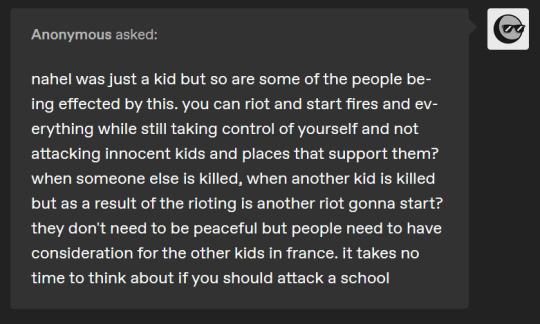
hi anon! I'm glad you're asking this and I'll try to be careful and kind in my answer. If my tone comes off kind of angry I apologize, I just meant to avoid this kind of reaction with my post.
I'm gonna try to answer this in two big parts where it seems we disagree : first the "how hard is it not to attack schools" side of the problem.
Then I'll go more widely on the questioned necessity of destruction and its nature.
(also I apologize if not everything is clear, the French to English brain on this topic is kinda weird, I'm open to more asks if you want something more precise).
Alright, PART UNO, Why Burn Down Schools
Okay, so absolutely no offense, but I'm gonna guess you were a good or at least okay student and therefore had a good relationship to school. I'm also gonna assume you didn't go to school in the banlieue or in establishments on the REP/ZEP list (Network or Zone of Priority Education), this classification is done based on the IPS or Social Position Indicator. Etablishments in REP in Paris today are around 90; the one I went to as a kid around 74; in Nanterre, where Nahel was killed, high schools are around 90 and middle schools between 80 and 90. By comparison Henri IV and Louis Le Grand, two very prestigious high school in downtown Paris have an IPS of around 140. The point being that in those spaces, even if you personally do well as a student, most of your peers have a very different relationship to the institution that is "school".
It has been widely accepted since Bourdieu's Les Héritiers (1964) that school is a machine that reproduces and legitimizes inequalities. We know children of workers, little employees, and people working low wage jobs do worse in school than children of teachers, or state workers, or people working high paying jobs, or that have already done high level studies. We also know these kids get to school at the same time but with a different baggage, and that the baggage from relatively rich (in economic or cultural capital) kids coming from relatively rich families is favored over the baggage from kids from poor families. That is because the first one belongs to what Bourdieu calls "legitimate culture", which is not legitimate in and of itself but legitimized by the dominant class to keep itself where it is. I'm not gonna talk about Les Héritiers the whole time, but in addition to the class difference and struggle in legitimate culture is a struggle especially present in banlieues of foreign culture being considered illegitimate.
The point is not that poor kids or kids of color are bad at school and that's just how it is, but that school as an institution is already a violence to them. It is traumatizing, built to make them fail, all the while telling them it's their fault because school is fair and based on merit. But it's not, because it values things and abilities as if all students start off from the same point (which is false) and make them believe the run was fair (which is false as well). Sometimes the blame is on the teachers, but most often it is the institution that inherently fails them and lowers their self-esteem. (Also, fun fact, I think it was a study done by IPSOS that showed that if they had the same grade, let's say an average of 9/20, in CE1, kids of workers were more likely to be made to redo their year, whereas rich kids would go to the next level anyway).
So you're right, it's easy to think that you shouldn't burn down a school when your rapport to it is: "what a great place, even if it pisses me off sometimes, I learn things and I can see my friends and have fun, burning it down would not help". But when school is a) a violence to you, and b) a lot of the time already breaking down because regardless of what they say on TV the State does not allocate enough resources to banlieues, well it's easier to burn it to the ground (this way maybe they'll actually rebuild it and be careful about abestos/amiante).
That doesn't mean it's good or right or forgivable and therefore forgiven (that's to your own discretion), but what it is, is understandable. These kids are fighting against a whole system, the police, its support by the State, and more widely the State itself and its shitty handling of banlieues and their inhabitants.
Okay, PART DOS, Is Violence Necessary, If So Which Kind
I'm gonna assume and hope you're not one of the people jerking off to theoretical revolution and praising the black block but getting scared when things actually get serious.
You're saying you wish they would be capable of keeping the riots to actual figures of police violence, I guess, or at least try not to harm innocents or do too much collateral damage (thinking about libraries, etc. I hope you can understand how schools also stand as violence to the rioters now).
My gut reaction is to say that's just not possible. If you really want the revolution and the change that comes with it (not just repealing the 2017 law), you have to be prepared to make sacrifices and for collateral damage (again, not saying it's good or right, or that you should thrive for it, just that it's virtually impossible to do without it).
I know some people have been saying they should go to actual places of power, go shake Darmanin out of his fascist bubble, but I also think people don't realize what this means. In the banlieues, they are in known and mostly friendly territory, which makes it easy for them to use the "be water" strategy (scatter when cops arrive). They know these streets and where to run, where to climb, where to hide. If they were to go to downtown Paris? they wouldn't have any of these advantages, plus they would be faced with the anti-riot plan built into the very architecture of the city streets (Haussman and Napoleon III I hate you). Just like the Parisians demonstrated against the pension reform in Paris, the place they know, the banlieusards are doing the same in the banlieues.
Now endangering kids is not the way to go, there we agree. The point of disagreement is that you think the rioters are going to be the ones making victims whereas I think the cops will, and already have (see the guy killed in Marseille by a flash ball impact, or the one from Mont-Saint-Martin in a coma).
(If you want to read something about the price of revolution, I'd recommend Les Justes by Camus, it's pretty short and you can come to different conclusions when you're done.)
You wrote "people need to have consideration for other kids in France". That sounds a tad condescending to me but I don't think you meant it that way. The problem is that they are not considered by other kids in France! as was showed in 2005 and as is showed today by the reactions on social media. You are asking the oppressed to make the first act of love here, and in a way you're right, Paulo Freire would say that next to violence, a revolution is only successful if it contains radical love, and that cannot come from the oppressor, but it is also a hard thing to ask of people. Especially when they know they will be ignored if they don't shake the political landscape a little.
I think you would enjoy reading Paulo Freire's Pedagogy of the Oppressed, it's not too long and it's very interesting regarding this topic.
Now I'd be careful with how you talk about the kids needing to "control themselves" because it sounds condescending here as well (though again I don't think that is how you mean it) and can be understood quite badly. I think what you may be alluding to however is the crowd effect that the riots can have. Once you start, breaking things with your friends, it does feel good, you release energy, you laugh, it's a good time really. The risk is to take the euphoria too far and not realize what you're doing, which of course happens but is really magnified by the media and is actually pretty marginal in the actual riots. But you're right that being in a group makes you forget about yourself (see: demonstrations, sport fans, etc.) and the rioters are not exempt from that.
I think, if anything, what one could fault the rioters for is that they are alienating themselves sometimes from their own communities. That is really going the same as in 2005 I feel like, with some worried moms, or people who agreed at the beginning but think it's lasting too long now. The problem is that politically, the people saying they will stop the riots are the National Rally (fascists) and at a smaller scale Rebirth (Macron's party, right wing). But Macron won't be able to run again next time (we wouldn't want him to) and I doubt his party is gonna hold without him. That leaves us with the fascist RN. So the kids could be building up to their own destruction.
(It is still important to say that even if the RN is elected next time, it will NOT be the rioters fault but the fault of the people who voted for a fascist party to lead the country.)
I don't think I have anything left to say right now, if you have other questions/need precision my ask box is open!
If you want to read more about school as a very imperfect institution I would recommend reading stuff from François Bégaudeau, Entre les murs (it's fiction inspired by his reality as a teacher, there was also a movie), he also mentions it regularly in talks that you van find on YouTube. I'll recommend again Paulo Freire's The Pedagogy of the Oppressed because it really is an amazing book.
P.S. I wrote this with less than 5 hours of sleep so I might be repeating myself and/or forgetting things
23 notes
·
View notes
Text



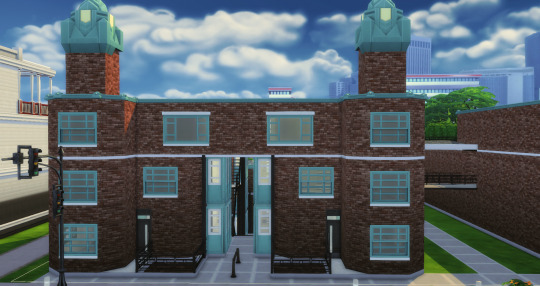
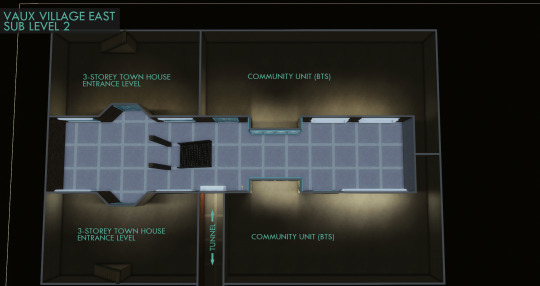
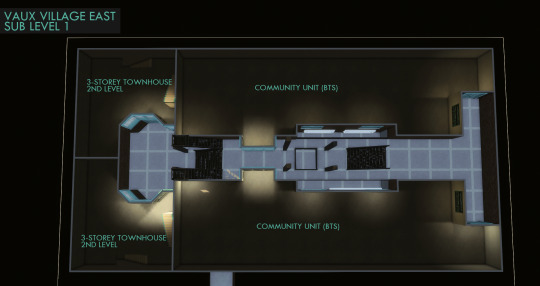

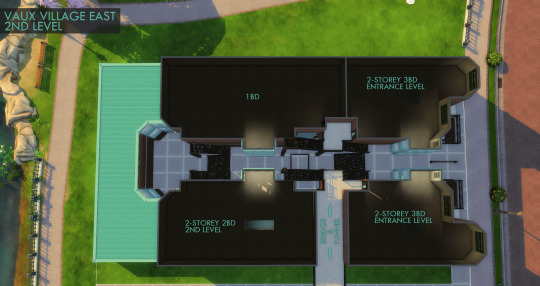


WIP... The Vaux Villages, colloquially known as Vaux Street. The floor plan is the same for both villages. I love this build so much. It will not be fully furnished because it's already a beast as it is right now. There are two sub levels and three above ground levels. Nine residential and four community units in each village.
It's the origin of the Vaux Street Allstars, but also features in Keystone and We Got Us, so you'll get to see many of the different parts of this behemoth as the stories go.
[lore under the cut]
The Vaux Villages are the result of a social experiment that was developed by The Venango Group in the late 1910s and was implemented in the mid 1920s. The goal was to observe how citizens of various socioeconomic strata and racial/cultural/religious backgrounds interacted with each other when there were no land-forms, bodies of water, or man-made structures to demarcate class, caste, or cash.
The experiment officially lasted 53 years, about two generations. Initially, the county was behind it, but as times and leadership changed, The Venango Group were afforded less and less privileges and encountered more and more ordinances that restricted what they were allowed to do.
It all started in the late 1950s, when the permit approvals for the 3rd and 4th villages were delayed again and again. Then it was one thing after another. The final straw was a zoning ordinance that was put on the books in the mid 1970s that prohibited non-educational research in that area. As the group was not affiliated with a scholastic institution, they would be in violation of the ordinance if they continued.
The one saving grace for the families that lived there and the community they nurtured was that the edifices and the land they were built upon were part of an irrevocable, ironclad trust, so try as they might, the county could not reduce the villages to rubble and the lives of those who dwelt within along with them.
These days, The Venango Group still manages the property, and rather than by selection, residency is inherited or gifted. In cases where the resident does not declare the recipient before departure, succession laws are followed or recommendations are voted on by the community.
#ts4 build#wip#ts4 screenshots#simblr#sims 4 build#black simblr#keystone#keystone wips#show us your builds#showusyourbuilds#ts4 builds#keystone lore#keystone builds
11 notes
·
View notes
Note
as someone who stumbled upon your panopticon kp meta and spent the last two days researching the surveillance theory while ripping my hair out, i need you to recommend me some books or even academic articles on social theory that you think are important or interesting. i’m still in undergrad and am finishing up my social psych class (which was very surface level, “i can google it and understand it” kind of stuff), anything that you think is interesting to look into, please tell me!!! doesn’t even have to be social theory, any books or journals that you liked, let me know because i will read the heck out of them 😵💫
Sorry this took me so long to answer, anon! I wanted to wait until I got back into my office and had access to my books.
Okay so first, this is THE BEST ASK I HAVE EVER RECEIVED. I am LOVING that you want to read social theory because of my kp meta, this is my crowning achievement, my glory in life.
Ahem. Okay. SO, a few selected recommendations for people wanting to dig a little deeper into social theory.
Note: Most of these are in the public domain and can be found for free by googling them with 'pdf'. Also available at libraries!
Discipline and Punish by Michel Foucault
If you loved the panopticon meta, this is for you. Foucault can be REALLY dense, so this isn't exactly an easy read, but it's utterly FASCINATING. While the focus is on the evolution of modern-day prisons, the theories are broadly applicable to the structure of our society more generally and how we monitor and control bodies. also good for analyzing kink in kinnporsche
2. Capitalism and Modern Social Theory by Anthony Giddens
If you're really curious about the three big classical social theorists (Marx, Durkheim, and Weber) but don't want to, say, read all of Capital, this is a great place to start. Giddens analyzes the main big ideas from each of these theorists and gives you some great context and background. You wanna engage with the Marxist debate around rich kid Mile funding his own gay mafia fantasy? Start here.
3. The Presentation of Self in Everyday Life by Erving Goffman
This book changed my LIFE. It connects the personal, internal sense of self with the way that self-understanding is formed through society and social interactions. If you're intrigued by how Kinn presents one 'self' around his family and an entirely different one around Porsche, this is your book. It's got dramaturgical analysis, it's got looking-glass self, it's got it ALL.
Note: For a slightly more confusing but equally enthralling take on this topic, see Mind, Self and Society by George Herbert Mead.
4. The Protestant Ethic and the Spirit of Capitalism by Max Weber
If Giddens gave you a taste of Weber and you can't get enough, go here. Again, life changing. Connects dominant Western religious attitudes with the rise of capitalism. More fun than it sounds. Iron cage of rationality, enchantment, and Weber was definitely into religious erotica so go here for all your VegasPete needs. also go to Discipline and Punish
5. Gender Trouble by Judith Butler
Read everything and anything by Butler, but start here. If you think gender is a scam and biological sex might be, too, this book will speak to your soul. If you want to talk about how Kinn performs the role of 'mafia boss' in a very gendered way, takes after his mom, uses soft power, etc. this book is your best friend. Also gets into sexuality, here's an amazing quote: "heterosexual melancholy is culturally instituted as the price of stable gender identities" WHAT ARE YOU WAITING FOR, READ THIS.
#social theory#kinnporsche#asks#BY NO MEANS AN EXHAUSTIVE LIST#this could be so very much longer#i also focused on books rather than articles but I'm kind of a believer in going straight to the source? so.#god this is making me want to read social theory again UGH i'm in PAIN
84 notes
·
View notes
Text
Mark Watson recently asked on Twitter what comedy show people would like to see. He meant in terms of people who might do stand-up over the internet, so I’m going a bit outside the scope, but how’s this for an answer?
A campus-based sitcom about the performing arts troupe of an unnamed prestigious university. Two people who have just been cast in a play spend the first episode not getting along too well due to having somewhat clashing personalities (one is very cautious and reserved, one is always looking for trouble), but at the end of said episode, they get drunk together and find they actually enjoy each other’s company. They end up sitting outside a bar while having a mildly slurred conversation.
Person #1: You know, I have to tell you something. I’m supposed to keep it secret but I have to tell someone.
Person #2: I knew it, you’ve killed a man.
Person #1: No, it’s just… I’m not really a student here. I lied on the forms for the play. I don’t even have an email address.
Person #2: Oh, thank God you have a weird secret too! I’m not really Welsh. [note: Person #2 has been speaking with a Welsh accent for the whole episode so far, but at this point he reverts to an English one, from the general western region but not so far west as to actually be Wales.]
Person #1: Well that’s interesting, that we both have secrets that will now bind us together. I lied because you have to be a student to get into the plays and I just want to perform comedy. Why are you lying?
Person #2: I… I’m not really sure, actually. I just sort of started doing it one day and then I had to keep it up to avoid social embarrassment so I guess I’ll have to be Welsh forever now.
Person #1: You are the weirdest fucking person I’ve ever met, let’s be best friends for the next twenty years.
The rest of the show is about these two people being friends and taking part in the troupe while trying to protect their own and each other’s secrets, with many near-misses that are only saved by comedic misunderstandings and hijinks. There’s the occasional bit of social commentary as they explore the way pretending he’s part of a prestigious institution opens up opportunities that Person #1 would have missed otherwise, but it’s mostly just classic sitcom shenanigans.
One time they go to an off-campus bar where a man named Ghod Rilbert hears them talking in their normal accents about the web of lies they’re both spinning, and he tells Person #1, good on him for sneaking his way in with all those posh assholes who actually are students at this prestigious university (Person #2 listens to this with comedic discomfort), it’s time the working class people got a chance. Person #1 heartily agrees, but is too embarrassed to admit he did actually recently finish a degree at a different university, not as high-level a one but still. Ghod Rilbert then yells at Person #2, telling him he shouldn’t pretend to be a member of his culture (Ghod, of course, speaks with a very gruff Welsh accent), but admits that it’s too weird to be really offensive, so he buys them both beers and hangs out with them for the night.
They become friends and the two main characters continue going back to that bar because this somewhat older guy (sort of thirty-ish instead of early twenties) will buy them beers whenever they’re there. This makes things awkward for Person #1, since around Ghod Rilbert he has to keep up the ruse that he’s a working class guy who’s never attended university, while keeping up the ruse to everyone else that he’s a current student. Person #2 feels awkward during these times because he actually dislikes the taste of beer and prefers to drink wine, but he’s trying not to look like one of those posh assholes that Ghod assumes all university students are, and of course he’s too polite to complain about free drinks, so he forces down the cheap beer that Ghod buys them. In one episode they tag along with Ghod on what was meant to be just some errands but in classic sitcom style it turns into more than that, we get a look at Ghod Rilbert’s life outside that bar, and of course what we see is completely unhinged.
Now look, I realize this requires a little artistic license. I realize Mark wasn’t using the Welsh accent in university and Tim got caught out as not being a student pretty early into the lie. But just go with it. We’d all watch that sitcom, right? Incidentally, I want Rhod, Mark, and Tim to play themselves, and the show to just never mention why the actors look a couple of decades too old for the characters. Person #1 and Person #2 will have their characters named in some similar way to Ghod Rilbert, like Kim Tey and Wark Matson. The other major character will be a musical redhead who's their friend in the comedy troupe, and that character will just be named “Alex Horne”, but he’ll be played by Tim Minchin.
28 notes
·
View notes
Text
Group Activity #3
The final modules, seven to nine, provided a great variety of multimedia materials. We chose to write a short blog about “What is globalization? understand our interconnected world” and “Bourdieu: Cultural Capital, The love of art & hip hop”. The first video provided a clear explanation of globalization and the current implications it has on the world. The interconnection of the modern world allows for ideas, products, news and styles to spread faster than ever before; this is one outcome of globalization (CFR Education, 2019). Our second video was interesting as it related Bourdieu's idea of cultural capital to the hip-hop movement. Cultural capital is the social and cultural advantage that some people have, typically in a position of wealth. The rise of hip-hop created a new outlook, as people are building a new cultural discourse (Then & Now, 2019). The videos were chosen because of the fascinating and concise explanations to the overall discussion of how sociological ideas “speak to” one another, as well as how they will expand on the issue of inequality.
The idea of globalization and Bourdieu’s concept of cultural capital greatly connect to one another, mainly through their understanding of accessibility to certain resources relates to economic power. Globalization describes the rapid spread of goods, resources, behaviors and information on an international scale (CFR Education, 2019). It brings about many positive effects, such as facilitating access to information and technology-based forms of social interaction, but also comes with consequences for countries that are exploited for cheap labour and resources. According to Bourdieu, cultural capital refers to knowledge, expertise and educational credentials which can be accumulated and exchanged to acquire or maintain social influence (Hooks, Module 7). It can be understood as a means to demonstrate one’s status and economic standing (Then & Now, 2019). These two sociological ideas relate to one another by demonstrating how economic power is maintained in two different contexts. With globalization, the role a country takes regarding the production of the exchanged goods is largely dictated by their economic standing. This allows wealthier countries, who primarily consume these goods, to maintain their economic dominance over poorer countries, who exchange their labour for minimum profit. This thus also limits the poorer countries access to a lot of the products readily available in wealthy countries. A similar exclusion is seen between social classes when discussing cultural capital. Since many of the activities which the elite engage in require higher levels of education, thus also requiring a good economic standing, lower economic classes are prevented from participating in them. This allows for wealthier classes to maintain their position due to the advantages that come with being able to partake in such cultural acts, particularly in social institutions.
Inequality is a persistent issue in human society, and in the increasingly globalized modern era. The world is changing rapidly, with these issues being more widely discussed and accelerated in their spread. In this context, individuals and groups with traditional cultural capital are often better able to adapt to change and seize opportunities. In contrast, groups lacking cultural capital find themselves in a more unequal predicament, as their cultural capital is being rapidly marginalized. The rise of hip-hop music provides us with a fresh perspective for observation and understanding, facilitated by the rapid spread brought about by globalization. As a cultural expression originating from marginalized groups, hip-hop music not only brings marginalized culture back into the public eye, but also unites more groups oppressed by inequality. Therefore, it raises awareness of the existence of inequality and challenges the existing unequal patterns to some extent.
The videos offered a comprehensive illustration of how sociological concepts intersect with one another. The theoretical principles examined in both media types assisted in clarifying the problem of inequality.
CFR Education. (2019). What is globalization? understand our interconnected world. YouTube. from https://www.youtube.com/watch?v=wLNp3kgBuuQ
Then & Now. (2019). Bourdieu: Cultural Capital, The love of art & hip hop. YouTube. https://www.youtube.com/watch?v=th0eYWnGZ_4
6 notes
·
View notes
Text
Sole survivor posting jumpscare
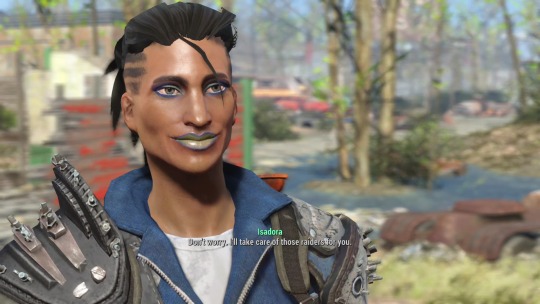
Her name is Isadora Vaz Yamada (Often called Ivy), she's from Florianopolis, Brazil. The green and blue makeup is based off of peacocks, which she kept as pets growing up.
She went to C.I.T for college, becoming top of her class in robotics. Ivy is actually the inventor/mom of the Assaultatrons! She sold the patent to Robco and forever bitches about how they screwed up the coding. Her robots wouldn't have gone haywire 200 years later—Codsworth is proof of that. She made him from scrapped Mr. Handys for a class project. The Assaultatrons were made while drafted out in China, where she served as a combat engineer.
Some more details on her bc I love her sm
Romances Danse. Her last relationship was traumatic and put her off romance, and Danse had all his shit going on, so it took a long fuckin time for them to talk and figure things out
Isadora grew up rich. I think her family might have owned tourist resorts and such? Like, a family that's very concerned with interior decor, and the make and build of furniture. She had two sisters and brother, but wasn't very close with any of them. Wasn’t tight-knit with her parents, either. They didn't have a bad relationship, but she was just a very different person from them. No ill will, but they just didn't get her at all.
People not seeing her nuance and complexities would follow her throughout her life. She was a very open and bold person, but people tended to see her only as an eccentric STEM. Most of her romantic or sexual partners didn't try to really listen to her either, which would be a major insecurity for her as she grew older.
You know how someone can love you, but...only what they think you could be? Or what you are on the surface, and no deeper? That's Isa and her relationships, platonic or otherwise. So even though she's social and emotionally vulnerable, she was never able to have intimate, personal relationships. She feeds into it sometimes, and often feels like a performer acting herself on stage for everyone else.
Her biggest flaw would definitely be a sense of superiority. Since many people in her life were shallow, she falls into the trap of "I'm not like other girls", except...for everyone? Grew out of some of it during the military, as she aged, but definitely was made bitter, and grandstands as a defense.
Has a tendency to talk down to people, will use a baby voice to address the factions. She's leader of the Institute and Minutemen, able to form an alliance with the RR and BOS, as shaky as it is. Her baby-talking towards Desdemona and Maxson doesn't help tensions. But the Institute also hates her, so at least they all agree on something.
Very tall, 6 3". Athletic, dorito-body build. Broad shoulders, narrow waist and hips, big thighs and legs.
1 STR, 7 PER, 3 END, 6 CHR, 6 INT, 4 AGI, 1 LCK. She's all brainpower. Her CHR and INT i level up, so it's actually higher, but that's her base stats.
Uses a sniper rifle, a sawed off double barrel shotgun, and an automatic Institute laser rifle (for the blue lasers)
She's a rum aunt type. Will help you pick out clothes while telling you why you should dump him
Pansexual
Pro-synth because machine or not, she loves robots and treats them with the same respect as humans. Considers the Assaultatrons and Codsworth her children as much as Shaun
Almost cries when they have to put down a haywire Assaultatron
Pretty unflinching, nothing really shocks her or makes her pause. Then Far Harbor happened and shot her nerves to shit
Renames Shaun's synth kid to Julian, deeply encourages him to be his own person and understand that he is an individual, not a copy or fake. Very affectionate to him all the same, he reminds Ivy of her brother when he was young.
Didnt really...care...when Shaun died. She didn't want to have him, but she did love her baby. Shaun wasn't her baby, he was his father's son. Ivy has a lot of guilt over these feelings, and doesn't bring them up to anyone.
5 notes
·
View notes
Text
Had a bleak dream last night:
Basically, the world is run by an unnamed institution. This institution has built a massive stadium, at least ten times the size of an American football stadium. The institution seeks out and collects everyone of a specific social group/standing, then sends them into the stadium. (The reasoning behind this could be population control or something similar, but they never actually tell anyone why they do it.)
The stadium is full of death traps and torture devices, mainly psychological in their design:
There is a mirror maze that they have to navigate without touching the walls. If anyone touches the mirrored walls, they are pulled into them and stuck inside them until they die. However, the mirrors are warped and inaccurate, making it hard to gauge one's distance from their reflections.
There is a sprawling supermarket level. In it, they have to gather different supplies from many different areas within the market. There are employees within the market that patrol the aisles. If they catch anyone stealing any supplies, they chase those people down and kill them. The people sent into this level do not have any money, meaning that they have no choice but to steal supplies from the store.
(There are more puzzles than that, but I forgot the rest of them.)
Every 10-20 years, a new generation of victims--from the same class/social standing--is captured and dropped into the stadium. The younger part of the doomed generation is forced to watch their friends/parents go through this torture/execution.
The Institution tells the children that escape is possible, and that they just have to learn how to navigate the puzzles and traps. However, there are never more than one or two--out of the thousands of people dropped inside--that actually manage to survive, but their fates are never published, and nobody ever learns anything from them because of it.
So... yeah. I actually dreamed up this scenario. Kinda messed up.
#this feels like a metaphor for something?#idfk#anyway yeah#dreams#one time i dreamt#i have no mouth and i must scream#< felt like that#hope you all are getting hugs
3 notes
·
View notes
Text
Books I read in 2023
This is a bit late, but I wanted to post about the books I read last year, partly because it's fun and partly because I think it'll motivate me to read more in 2024. I'm excluding books I read for classes unless there's something I have to say about them, and I'm also excluding one nonfiction, political book I read at the start of the year, because I don't remember it well enough to share my opinions accurately.
Fiction
The Ministry for the Future (2020) by Kim Stanley Robinson
A pretty good book; it's about various groups working in the near future to fight climate change, some of which resort to extralegal tactics. It presents a pretty bleak future with a high level of impact from climate change; I thought it was good, but if you're the type of person who catastrophizes about climate change it may not be the best book for you. There's a lot of procedural stuff and description of how organizations work, too — it's not just describing suffering. This book has a moderately anti-capitalist message.
Invisible Man (1952) by Ralph Ellison
Reading this book is an interesting experience; Ellison's writing style is often quite surreal and reading can feel like walking through thick grass. If you don't like that, you may not want to read this book. It's about an African-American man who moves from the South to New York in the 20th century (pre-Civil Rights Movement), and his experiences along the way. There are strong political messages here, although they're less obvious 70 years on. Black nationalism/separatism are discussed and critiqued, and the main character ultimately ends up isolated from society.
The Truth (2000) by Terry Pratchett
This is a fantasy novel about the first newspaper in a society. It's pretty great — one of the best of the Discworld books I read this year. It's got a pro-journalism message.
Going Postal (2004) and Making Money (2007) by Terry Pratchett
These two Discworld novels, in a medieval fantasy setting, are both about Moist von Lipwig, a clever criminal who's spared from execution by the city's mostly-benevolent tyrant and forced to become a civil servant instead. He reopens the postal system and invents fiat currency (in this way we get a look at the institutions of our own civilization), becoming more ethical and exposing corruption along the way. Both books are good, but I think Going Postal is a little better.
Huda F Are You? (2021) and Huda F Cares? (2023) by Huda Fahmy
These are a pair of semiautobiographical graphic novels about a Muslim teenager growing up in Michigan. Huda F Are You? focuses on the protagonist's struggle to define her identity and make friends in middle school; it was emotionally engaging and quite relatable. I wish I had been able to read it when I was in middle school! Huda F Cares? focuses on the protagonist's relationship with her siblings and her struggle to practice her religion, despite prejudice from society and her friends' at times differing values. I found it slightly less compelling than Huda F Are You?, but still definitely a book worth reading! Perhaps that's because I'm an irreligious only child.
Klara and the Sun (2021) by Kazuo Ishiguro
This book is definitely science fiction, but it has a much more personal and melancholy tone than most sci-fi books. It's told through the perspective of an unusually perceptive and empathetic robot who worships the Sun, in a world where... well, it would be spoilers to talk about how different the world is! Let's just say that the book explores loneliness, intelligence and its relationship to society, and the possible effects of technological progress. I've heard that this book is supposed to deal with AI, but I found its message to be pretty far from the concerns raised by recent advances in large language models (LLMs) and image generation. I'd say that social media (vis-a-vis a decline in real-world socialization) and pre-LLM automation relate to the book's world more than today's AIs. Klara and the Sun is also very well-written.
Nonfiction
Musicophilia: Tales of Music and the Brain (2007) by Oliver Sacks
A fascinating exploration of the psychological and neurological aspects of humanity's affinity for music, this book strings together a series of anecdotes from the author's time practicing medicine about how music affects the brain, especially among people with rare brain disorders. There are some truly fascinating — and surprising! — cases discussed. These are interspersed with explanations of what we know, and don't know, about why music has such an effect on the human brain. Overall, this book was quite interesting, and I recommend it to anyone with even a passing interest in these sorts of topics.
#the ministry for the future#invisible man#discworld#klara and the sun#huda f are you#musicophilia#reading
1 note
·
View note
Text
Week 5: "Exploring Race, Segregation, and the Impact of the Black Lives Matter Movement: Lessons from Recent Discussions"
Our discussion in class this week on segregation and race was very interesting as it was partly new for me. As open discussions on race are only starting now in France, I feel that there is a comparatively large emphasis placed on it in the UK (where I have been studying for the past two years) and even larger in the US (where I just started studying since early September). In our class, we discovered that African Americans have faced significant disadvantages in various aspects of life, such as housing, employment, and overall societal inclusion. These disparities have had enduring impacts. Consequently, I am very grateful for this course because it has taught me to view the Black Lives Matter movement within a broader context, rather than solely as a response to a corrupt police force. I was especially taken aback by the government's systematic discriminatory housing policies targeting African Americans. What was even more astonishing was the persistence of residential segregation as a significant contemporary issue, despite the term itself fading from common use. This segregation, as described by Doug Massey in 2020, continues to be a fundamental and unaddressed aspect of modern race relations that both society and institutions seemingly choose to overlook. I gained various insights regarding the societal structure from this discussion, and I made an effort to contemplate its implications.
One aspect is the concept of the "culture of poverty," which suggests that individuals are impoverished due to having a deficient culture. For instance, academic success might not be highly regarded in this context. However, I find myself somewhat skeptical of this notion. My recent research collaboration with the French charity Institut Louis Germain, focusing on the education of underprivileged children in France, has revealed a different perspective. By providing talented high school students from modest backgrounds with the knowledge and skills necessary to enter prestigious university programs, we observed that it not only fostered tolerance and social progress among the participating students but also among their families and friends. However, I am aware that this study took place in France and that the two cultures are very different.
The second point concerns the actions of white society in relation to segregation and, consequently, desegregation. James Baldwin's statement about ghettos being "created and maintained" by white institutions and "condoned" by white society really resonated with me when I watched the video depicting how white parents in Seattle and its suburbs obstructed school integration. These white parents withdrew their children from public schools and enrolled them in private schools when they were assigned to southern, and therefore underfunded, schools. While I can understand this decision on an individual level (as I wouldn't want my child to endure a long bus ride to attend an underprivileged school either), from a structural perspective, their collective actions mirrored the very mechanisms that perpetuate racism. Moreover, the schools with the highest minority populations received the least funding, and this situation worsened when white children were transferred to private schools. Hence, the 2020 data from Logan et al. (2021) aligns with my understanding that there hasn't been a significant breakthrough in desegregating American neighborhoods.
Nevertheless, it's essential to consider the impact of the Black Lives Matter (BLM) movement, which began in 2020. In fact, Bloomberg published an article on September 26th 2023, stating that Corporate America responded to the mass protests ignited by George Floyd's murder by significantly increasing the hiring of people of color, aiming to address the pronounced racial disparities within their workplaces.
The most significant changes in 2021 occurred in lower-paying job categories like sales workers and administrators, but this trend was also observed in well-compensated and influential managerial and professional positions. Remarkably, even at the executive level, over half of the newly added jobs went to workers of color. This demonstrates that when organizations face pressure to recruit and promote diverse, qualified talent, they are able to take action, often by making substantial financial commitments and dedicating resources to initiatives aimed at achieving racial equity. Consequently, I am left pondering whether this could be seen as a step toward desegregation.
1 note
·
View note
Text
10 Key Factors to Consider When Choosing a Digital Marketing Course

10 Key Factors to Consider When Choosing a Digital Marketing Course
Many businesses are investing in digital marketing as one of their primary operations as a strategy to reach more customers and increase sales. When you properly implement digital marketing strategies and practices, your business will yield impressive results.
It’s not surprising that many people are interested in digital marketing courses. It may be challenging to pick the best, with so many institutes all over the internet offering the course. Unfortunately, some institutes exaggerate the courses they offer more than they do.
When it comes to a digital marketing course, you want to make the right choice and get returns as soon as possible. Here are ten key factors to consider when choosing a digital marketing course.
Focus on Your Goal
Before you enroll in a digital marketing course, find out why you want to take the course in the first place. Evaluating your goals in taking up the course takes you closer to choosing the best one.
For instance, if you’re good at social media, you can choose a course in social media marketing. Or, If you want to master the basics or upskill, you can opt for a diploma or postgraduate in digital marketing.
Once you determine your goals, it’s easy to navigate and narrow down a specific course and know what to expect. Therefore, it’s worth focusing on your goals to determine your needs and whether it’s worth investing your time and money in the course.
Courses With Different Modules and Projects
One thing about digital marketing is that it’s dynamic, and you must keep up with the trends. For example, when taking an advanced course in Search Engine Optimization (SEO), you must also learn about popular trends like voice search, SERP, and mobile-friendliness.
The main challenge of most digital marketing courses is that they are outdated because the industry is moving fast, and they may not help advance your career. However, a course with different modules may help you learn the latest practices and advanced concepts.
Another important consideration when choosing a course is hands-on projects. Digital marketing is all about formulating and executing concepts. Practical projects equip you with the skills you need in the real world and help you understand the concepts better.
The Course Fees

Think of the digital marketing course as an investment where you are adding to your skill sets, and you will reap the rewards. Like any other investment, it comes at a cost, and the course fees should be affordable.
The fee structure depends on the duration and the level of the course. A short-term course that runs between 3-6 months is cheaper than courses that run for a year or two. The fee will also be higher for a bachelor's degree in digital marketing compared to a diploma or a certificate course.
The good news is that you can apply for a student loan when the fees are too high. Alternatively, opt for online courses taught by experts such as Coursera, edX, and Udemy, which are affordable and widely recognized.
Desired Schedule
When choosing a digital marketing course, you must consider your availability to complete the course. The best thing is that there are different self-paced courses that you can learn at your convenience.
Online learning offers interactive virtual classes with peer-graded assignments. It stands out because you can schedule your lessons and projects to fit your regular schedule. The courses also provide you with provisions to seek help from the tutor on challenging topics.
Check Testimonials
The secret to understanding whether a digital market course provides value is checking testimonials and reviews. Testimonials offer an honest view of the course because students will always vouch for a valuable course.
Check the reviews from an institution’s website and social media pages. Doing so offers you a glimpse of the scope of the course, and you will know how good the course is. As a result, you can make an informed decision on whether to enroll in it.
Qualifications of the Trainer
Digital Marketing is a broader term that branches into specialized domains like SEO, link building through guest posts, email marketing, and content marketing. Each of these specializations takes training and years of experience to become an expert.
With this in mind, you must learn about your trainer's qualifications, experience, and reputation. An experienced and knowledgeable tutor will offer you in-depth training in a specific course since they have hands-on experience. Visit the website to learn more about the qualifications of a trainer.
Certification

It’s no secret that a professional certification will boost your career. So, it’s best to choose a digital marketing course with a valid certificate that will open doors for better work opportunities. However, it doesn’t mean certification is more valuable than your skills.
Digital marketing offers you many certifications, from paid to free ones. The bottom line is that you must ensure that the certificate from your chosen course is accredited and recognized in the digital marketing industry.
So, before investing your hard-earned cash in a digital marketing course, ensure you conduct proper research to ensure the certificate is valid.
Resources
Digital marketing is more than just theory. You need significant interaction and practice with concepts to grasp the craft. Several applications, tools, and software assist in creating and implementing digital marketing strategies and are also important when learning digital marketing.
The trick to knowing the best digital marketing course is first understanding the resources you need. Check if the course is offering your resource materials like e-books, tools, and study materials instead of just theory.
Job Placement
Most students seek digital marketing courses to find placement, jobs, or freelancing. Taking the course is a step toward achieving this goal but finding employment may take more work than you think.
Thus, students may enroll in an institution for a digital marketing course to help them find a job. Though not all institutions help with this, some will guide you in navigating your digital marketing career by offering placement assistance.
Find out if the institution offers job placement, and learn about their placement partners to have a feel for the type of guidance they offer.
Final Thought
These ten factors provide a clear understanding of how to choose a digital marketing course amidst the many options available. Before investing your money and time, evaluate the value of the course and how it’s effective in your career growth and advancement upon completion.
Ensure you join a reputable course with expert and experienced trainers to help you improve your skills and knowledge in your desired digital marketing niche.
Read the full article
0 notes
Text
Tuition Free Public Charter School

A tuition cost-free public charter institution is a type of public school that is open to all trainees and also does not bill tuition. These colleges are typically a great choice for moms and dads that do not have the ways to pay for their child's education and learning, or for pupils that have unique learning needs that typical public education does not address. Typically, public charter schools run under a formal paper called a charter that describes the institution's objective, academic approach, programs provided and efficiency goals. The charter can be approved or rejected by a college board and is a lawfully binding agreement in between the institution and the local neighborhood.
There are various types of charter schools, each with its very own educational program as well as training methods. Some are concentrated on specific topics like mathematics, science or design. Others concentrate on social justice or ecology and sustainability. One of the largest advantages of the Tuition-Free Public Charter School in Lehi is that they give educators as well as educators more flexibility to explore their mentor styles and lesson plans. This enables even more ingenious training strategies as well as better student results. They additionally enable teachers to tailor their lessons for the specific knowing demands of their students. This is necessary because students' knowing designs differ based upon their personality and also interests. These colleges additionally have a better level of adult involvement than standard public schools, which is known to boost trainee success.
This is a huge reason that education and learning agitators and also political leaders prefer school option alternatives. The Lehi's Award Winning Charter School is a part of a larger motion to supply trainees as well as their family members with more selections for their education and learning. Magnet schools, voucher programs as well as open enrollment plans are a few of the ways that instructors think this ought to take place. No matter their method, all colleges need to fulfill certain scholastic and also financial standards. These are identified by the authorizer of the institution, which is normally a state or neighborhood board of education and learning. If the institution does not satisfy these standards, it can be closed as well as the funding moved to various other schools.
In New york city, the state's two authorizers-- the New york city Board of Regents and also SUNY Charter Schools Institute-- review all charter applications before they are approved or refuted. The authorizers check the performance, finances and organizational stability of charter colleges, as well as can close colleges that do not fulfill their instructional objectives. A tuition cost-free public charter institution is an outstanding option for parents who want to send their kids to a public institution that provides a much more rigorous as well as tough educational program than what is found in the district institutions. These colleges often provide innovative coursework as well as customized programs for pupils that have exceptional scholastic abilities or who need added support in class.
They can additionally use more alternatives for AP as well as standardized testing, as well as they might have less corrective activity than traditional public colleges. Some states offer a transitional aid program to enable public college areas to handle the prices of opening brand-new charter institutions. This aid can be up to 2% of the overall public institution financing. This can be a large help to public schools, due to the fact that it can free up funds that can be made use of to enhance student performance and teacher incomes. For additional details regarding this topic, check out this link: https://en.wikipedia.org/wiki/Tutoring.
1 note
·
View note
Text
Book Review: Troublemaker, John Cho
Book Title: Troublemaker
Author: John Cho
Reading Level: Lexile Unknown. Definitely upper elementary
Length: 224 pgs
Summary: Jordan is the younger child in a family that immigrated from Korea to Los Angeles for a better life. He and his father had a huge fight because he is not doing well in school and not a “good child” like his sister. The story opens with Jordan coming home from school because he is suspended. His parents are home because they closed their family liquor store early to avoid the unrest in the streets. Two of the police officers who brutally beat Rodney King have just been declared not guilty after their trial.
Jordan’s dad decides to go back to the store to board up the windows. Fueled by a scary conversation with a friend, Jordan decides his father needs the family gun for protection. He resolves to bring it to the store -- with no transportation, no cell phone, and only a vague plan.
He agrees to hang out with a friend, Mike, in hopes that he can get a ride to the family store in South Central. He ends up getting tricked into helping Mike rob his family’s store and spending the night running through Koreatown/South Central in an attempt to get the gun to his father.
Along the way Jordan and Mike meet a lot of people of different races who live in the area, get their help, and have some conversations (some oblique and some direct) about race, class, stereotypes, and nationality.
Ultimately, with help from his caring older sister, Jordan makes it to the store and Mike makes it home. At the store Jordan and his father reconcile. Jordan still has some consequences for his behavior and he also changes his worldview.
Tags: supportive adults, bullying, friendship, speaking up, grief/loss, boy main characters, church, Korean American, working class, immigration, racial conflict, riots, police brutality, murder, school, guns, parental expectations, parent/child fight
Genre: Realistic Fiction
Setting: Los Angeles, CA, USA, largely on April 29, 1992
Recommended For: Fans of historical fiction, social justice, discussing race relations, talking about family expectations
Opinion: I definitely recommend this book! I was also a child during the Rodney King riots, and I remember the tension and horror in the city when the video of King’s beating was released. At the time I did not know about the killing of Latasha Harlins, though I learned about it as an adult. This book did a beautiful job with pacing, smoothly introducing Korean American culture, discussing police violence in an age appropriate way, showing the depth and complexity of race relations, and talking about family conflict around culture/immigration/assimilation.
Cho successfully used many characters to show different perspectives about race relationships: why Black people might feel animosity toward Korean Americans, why Korean Americans might have many different feelings about their Black customers. Throughout the story, Jordan’s empathy toward Black people and his growing understanding of police brutality and institutional inequality provide an excellent opening for conversations on both topics.
I love the sibling relationship and how Sarah and Jordan are both able to (eventually) share their caring for each other and work together. This book does not have a tidy ending, which I also love. It leaves the reader with ideas and questions about how we care for each other, which was Jordan’s ultimate goal anyway.
0 notes